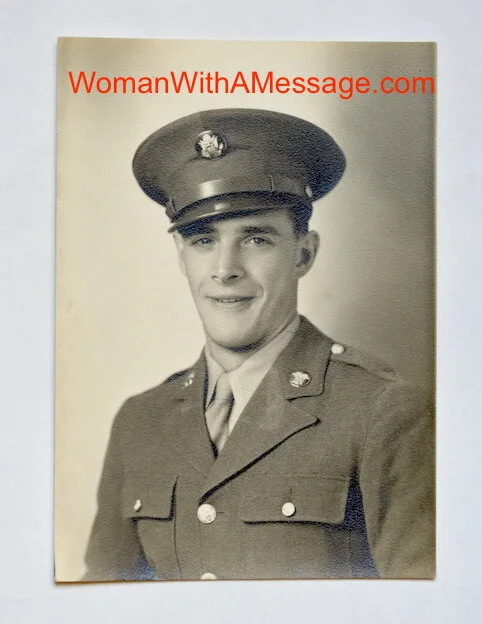Link to Family Tree to understand family relationships.
Moda, May 10. 45
My dear Eva! Since about a week I knew that you were getting married but only that. Neither I knew your surname nor your address. Lizette, Lilli and Ticco contrived the most incredible, no, the most credible excuses making me believe that they have only forgotten your letter. These good children didn’t want to excite me by showing me your writing because they wanted to conceal from me that Harry became a soldier. This I learned by a conversation with Ticco. Of course I insisted to bring me your letter. Yesterday Beppo brought it and I found out that Harry is in the South Pacific still but by no means I could make out that he is a soldier, consequently they must know more about him than they will declare to me. Excuse my long introduction. I am no more up to date and in my time we had been taught to do a long-winded prelude before going on with the real theme. Of course in German my style would be less circumstantial.
Sorry, I haven’t learned how a mother has to congratulate her daughter on her marriage in the case she is separated from her by war and ocean. Again I had the old-fashioned feeling of a sitting-hen which has hatched duck-eggs, cackling tremendously seeing her naughty covey diving the first time at duck-manners: “Köpfchen in das Wasser, Ärchchen in die Höhe.” [should be “Köpfchen in das Wasser, Schwänzchen in die Höhe” – head in the water, tail up] Simply I can’t imagine that my ducky Ebi is swimming in the pond and left me waiting and cackling excitingly. That your wedding took place on the 13 of January must have been a great surprise for Harry, whom I beg not to imitate you immediately. I was - Lord is my witness - with you all the time. On the 11 of January I thought: today it is Tillie’s birthday, tomorrow that of Hilda and a day after tomorrow that of Harry and I learned by my friend Gemma Gluck-LaGuardia (yes, she is the sister of the Little flower) sitting with her hand in hand what a great day it is to come of age. That this day shall be a double-festival to our family I couldn’t dream. - But today I will not relate, I will ask you to do it. At first please, introduce me to your husband. How is his first name? Ebi, do you remember your composition about Hagen? Yours was one of the best, only too short, remarked your teacher. In five sentences the German hero was settled. Well, that was all right, but my son-in-law is not the sullen Hagen, is he? I am sure that you are more interested in this theme and your description will be more detailed. Please answer me the following questions:
1. Are you happy, really very happy? And your husband also?
2. Where and how did you make his acquaintance? Is he an American by birth? Is he small or tall, thick or thin, blond or dark, light eyes or dark eyes? How old is he?
3. What is he doing except to be glad that his mother-in-law is over the big lake? Tell him that 2 parents-in-law in hand are better than one in the concentration camp.
4. How many Creme-Schnitten had you to pay Harry before getting engaged? And Paul, Hilda, Tillie, did they agree with you?
5. In which way you were you informed of my staying in Sweden? By dispatch, letter, or newspaper?In conclusion, I will only tell you that I am in Istanbul just one month. Our relations learned the news by the newspaper. Fortune, Estrea, Beppo, Bondi, and his wife cousin Romano paid me a visit just when they read my name in the Gazette. I am too excited today to describe to you how nice they are to me, and I am glad and proud having conquered the affection of the youth. Lilli and Lizette I see every Sunday, Ticco comes during the week to see me, Fortune, Estrea and Beppo come as time permits it. Moda is situated on the Marmara Sea - and to be reached by a boat not too frequently.
For myself war is not yet over inasmuch I don’t know where Vitali is. His last letter was from January 7.45 - I received it on February 7.45 and after three weeks I left Ravensbrück. I hope I can stay here till I know about Vitali. Please council with Harry what to do to be able to come to you. Lizette will tell you about her information at the American Consulate.
Have you received letters from me from Götheburg, Liverpool, Lisbon? How is Harry, Paul, Tillie and Julius, Hilda and Nathan, how is Tillie’s brother [Al?]? Fulda-Anderson family and did you hear from Robert? How is Bertha Schiller, her husband, Arthur and his family?
Please go to the nearest stationers and buy a ream of paper to answer all my questions. Tell Paul, Hilda, Tillie, Harry to send me long letters, I am letter-starved. In my suitcase there are letters from the Drottingholm still which I could not post. Next time I shall send it to you.
With many kisses I remain your
HelenP.S. To fill this space I will give you an idea of our Odyssey.
March 1. Departure from Ravensbrück at Lübeck.
Staying there 5 days, via Flensburg at Kopenhagen Helsian, sojourn 5 days
March 11. Arrival Helsingborg (Sweden) Götheberg by railway and now we climbed [boarded?] the Drottingholm”
March 18. Our ship put to sea at the waters of Norway
March 22 Färro Islands - Thors Hava [Tórshavn] 17 March
March 24 Liverpool
April 1 Port Said
April 10 Istanbul
April 15 Moda
After my mother had a stroke in 2006, I sorted through her papers to make sure I had everything I needed to be able to handle her affairs. As I searched, I found letters written from my grandmother from Istanbul in 1945-1946, a Red Cross letter from Vienna just before their parents were deported, and one from Buchenwald from Vitali to Helene. In addition, my mother had her cousin Paul Zerzawy’s official papers – school records, bank documents, death certificate from 1948. I was so excited to find all these items that I photocopied them and gave them to Harry since I imagined he hadn’t seen these papers in decades. I had never seen them. Little did I know that Harry had hundreds of letters from Helene and Paul stashed away that he never bothered to mention. Who knows why my mother had some documents and her brother had others?
Today’s letter is one of the first things I read in 2006. Happily for me, the letter was in English and it told me more about my grandmother’s experience than I had known. Until then, I knew the barest of details – she’d sent her children to safety in San Francisco in 1939 and for some reason she and her husband did not follow and ended up in the camps. I knew she’d been traded as a Turkish prisoner and had come to the U.S. via Istanbul and that her husband Vitali was never seen again.
When I first read this letter, I did not have the context of the hundreds of pages of letters that had been come before. After rereading it in preparation for this post, it feels like a synopsis of the entire archive: even if I had never seen the other letters, I at least had the facts of Helene’s years in Europe after being separated from her children and the sound of her voice.
Although Helene writes of other letters she’d sent on her journey to Istanbul, as far as I know those letters never made it to San Francisco. At this point she is feeling well cared for, before the Joint began moving her around Istanbul and Vitali’s relatives could not always find her. See post of February 2.
This letter reminds me that there’s more research to do. I had recalled that Helene mentioned talking to reporters, but had not remembered that she said that they had published things about her. When I first read her May 1 Joint testimony, it felt like another puzzle piece fitting into place.
Finally, Helene even explains her writing style. In the stories I posted on March 13 and April 22, I commented on how she sets the stage for her story and then takes us in amazing directions. In this letter she apologizes for the long introduction before going on to the “real theme.”





























